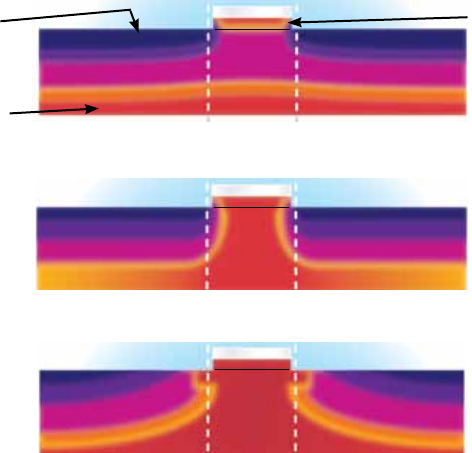
8 Overview and Operation
English 202052A
Check the 3M
TM
SpotOn
TM
Temperature Monitoring System website to ensure you have the most recent version of this document. www.spotontemperature.com reorder #202052A
How does it work?
e SpotOn temperature monitoring system uses zero-heat-ux thermometry to accurately measure a person’s core
temperature as characterized in Figure 3 below. 1) e SpotOn temperature monitoring system gently warms the
sensor creating an isothermal zone under the sensor. 2) Once equilibrated to the core temperature, skin-surface
heat loss to the environment is prevented and a zero-heat-ux condition is established. 3) When the temperature
sensor reaches equilibrium with the patient’s core temperature, the SpotOn control unit displays an accurate,
noninvasive measurement of the patient’s core temperature.
1) Placement and connection
2) Equilibration - isothermal zone development
3) Equilibrated - isothermal zone established
Figure 3: Isothermal tunnel formation with zero-heat-flux technology
SpotOn control unit
e SpotOn control unit displays noninvasive core temperature measurements obtained from the SpotOn
temperature sensor. e current temperature is displayed numerically, and previous temperature data is displayed
graphically as a temperature trend graph. When the sensor is plugged into the sensor cable, the control unit reads
up to the last two hours of stored temperature data and displays the temperature trend graph. Disconnections of
the sensor from the sensor cable are indicated by gaps in the temperature trend graph. e current temperature
measurement can be continuously transmitted to a patient vital signs monitor through the optional SpotOn
monitor cable using a standard YSI-400 type input.
SpotOn temperature sensor
e SpotOn sensor is constructed of two layers of medical grade foam and a exible circuit which contains a
resistive warming circuit, two calibrated thermistors, and nonvolatile memory. e information that generates the
temperature trend graph is stored on the SpotOn sensor. If the patient is transferred from one location to another,
the SpotOn sensor is disconnected from the SpotOn sensor cable so the sensor is le in place on the patient. e
SpotOn sensor may be reconnected to a dierent SpotOn sensor cable and control unit when the patient arrives at
the next point of care. Once the SpotOn sensor is reconnected to the SpotOn sensor cable, the system will begin to
reequilibrate and will regenerate the stored temperature trend graph and display the patient’s current temperature.
e act of disconnecting and reconnecting the SpotOn sensor from the sensor cable is indicated by a gap in the
temperature trend graph.
Skin
Surface
Deep Tissue
Temperature
Sensor


















